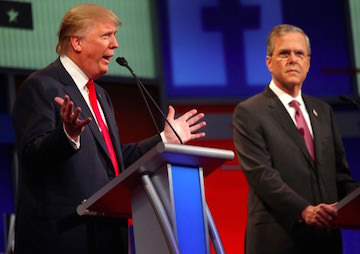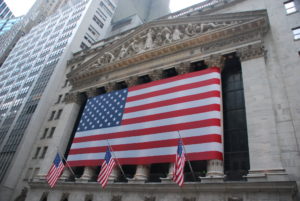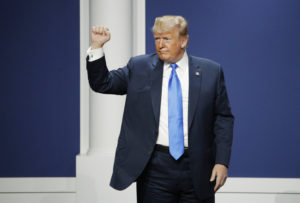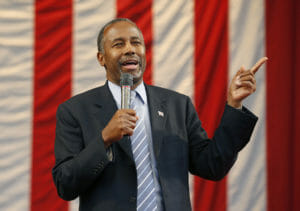The Real GOP Divide
The Republican presidential contest is often cast, accurately enough, as a choice between "outsiders" and "insiders." But another party division may be more profound: between Republicans who still view the country's future hopefully, and those deeply gloomy about its prospects.

Donald Trump and Jeb Bush in August during the first Republican debate among the strongest candidates. (Peter Stevens / CC BY-SA 2.0)
Maybe our definition of the Republican presidential contest is a little off.
It’s often cast, accurately enough, as a choice between “outsiders” and “insiders.” But another party division may be more profound – between Republicans who still view the country’s future hopefully, and those deeply gloomy about its prospects.
The pessimism within significant sectors of the GOP is more than the unhappiness partisans typically feel when the other side is in power. It’s rooted in a belief that things have fundamentally changed in America, and there is an ominous possibility they just can’t be put right again.
This is one of the big contrasts between the two parties: Democrats are more bullish on the future.
Hillary Clinton has a big lead in the national polls because Democrats broadly favor continuity, with some tweaks. Vermont Sen. Bernie Sanders offers a tough critique of inequality and the outsized power of the rich. But he and his supporters are comfortable with the country’s cultural direction and have enough faith in government to believe it can engineer the reforms that economic fairness requires.
These thoughts are provoked by an evening spent watching last week’s GOP presidential debate with a group of Republicans pulled together here for me by Sarah Stewart, a New Hampshire political consultant.
They were anything but pitchfork-bearing rebels, and many of them are involved with local government. There was not a Donald Trump or Ben Carson supporter in the lot, although Jon DiPietro, a libertarian-leaning businessman, said he gets Trump’s appeal and could imagine voting for him.
The debate watchers shared the media’s view in one respect: They all agreed that Jeb Bush had a bad night. DiPietro’s offhandedly devastating comment: “Bush had a typical poor performance.” Toni Pappas, a Hillsborough County commissioner, offered sympathy that was almost as crushing. “I feel badly for Jeb,” she said. “He’s really a bright guy.”
The consensus was that the strongest performance came from New Jersey Gov. Chris Christie, not Marco Rubio, the man lifted high by the very media he and the others enjoyed attacking during the event. Rubio gained ground with some in the group, but Newton Kershaw III, a successful developer, said the young Florida senator still hadn’t persuaded him that he had the experience to be president. Rubio, Kershaw said, looked “rehearsed and studied.”
Gary Lambert, a former state senator who chairs Sen. Lindsey Graham’s campaign here, was proud of the South Carolina senator’s performance in the undercard match. But he spoke for the group in praising Christie for having some of the evening’s best moments. Lambert also offered his take on Carson’s appeal: “He remains so calm. I could never do that.” Ohio Gov. John Kasich and Texas Sen. Ted Cruz also got some nods of approval.
But the most instructive part of the evening came toward the end when Ross Terrio, a Manchester school board member, took the conversation to a different place, describing his response to President Obama’s time in office. “I have gotten so pessimistic,” he said. “I used to be such an optimistic person. Maybe Obama just sucked the life out of me.” Terrio, who works as a pharmacist, has no complaints about his personal situation but wonders how his neighbors with much more constrained incomes can make it.
DiPietro shared Terrio’s worries that the country’s problems might be beyond our ability to solve, especially if Democrats win the White House again. Reflecting his skepticism about the public sector, DiPietro said he had warned his daughters about a dark future in which “government’s going to be reaching into your wealth.” Lambert’s worries focused more on terrorism and the rise of the Islamic State, one reason he supports Graham’s robust interventionism.
Others in the group pronounced themselves more hopeful, Pappas, perhaps, most of all. She highlighted her faith that the inventiveness and entrepreneurial spirit of the next generation would pull the country through.
But that this argument about the country’s long-term viability could break out among these thoughtful citizens — they in no way fit the stereotypes we liberals sometimes hang on conservatives — speaks to a central reality of our politics: Many Republicans see government itself as almost irreparably broken.
This is why there’s cheering on the right for the obstructionism of groups such as the House Freedom Caucus. Throwing sand in the gears of the machine is an honorable pursuit if you believe the machine is headed entirely in the wrong direction. It’s also why Trump and Carson will not be easily pushed aside.
Independent journalism is under threat and overshadowed by heavily funded mainstream media.
You can help level the playing field. Become a member.
Your tax-deductible contribution keeps us digging beneath the headlines to give you thought-provoking, investigative reporting and analysis that unearths what's really happening- without compromise.
Give today to support our courageous, independent journalists.





You need to be a supporter to comment.
There are currently no responses to this article.
Be the first to respond.